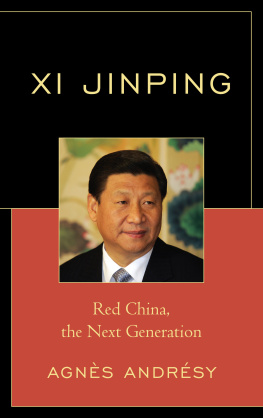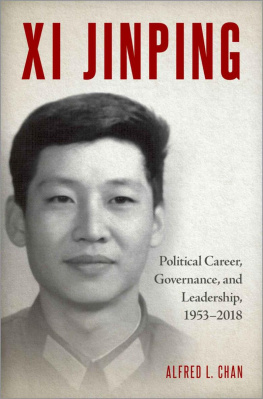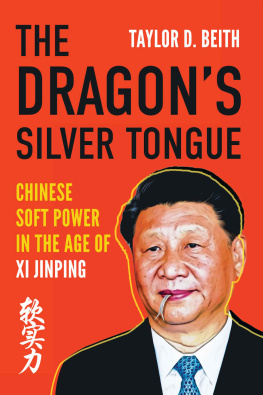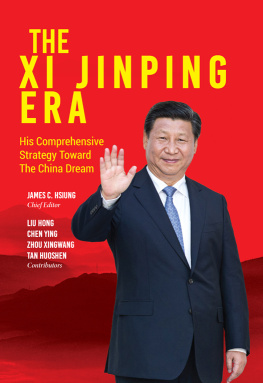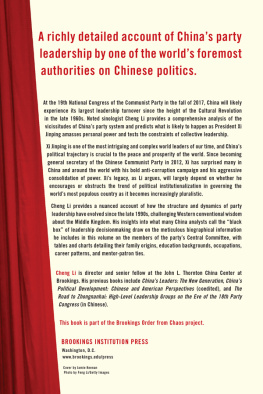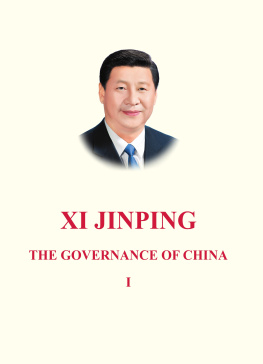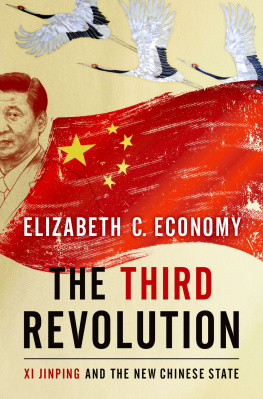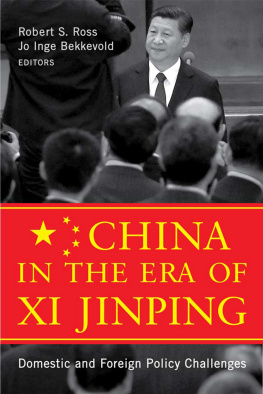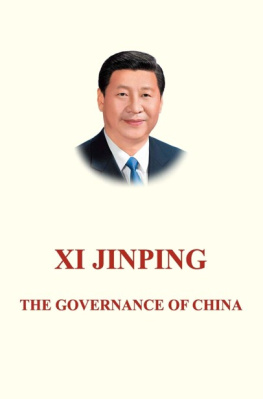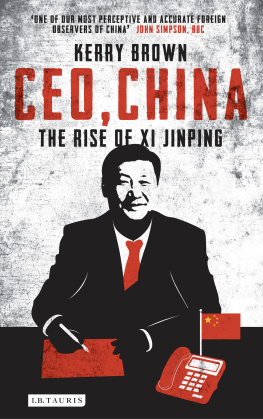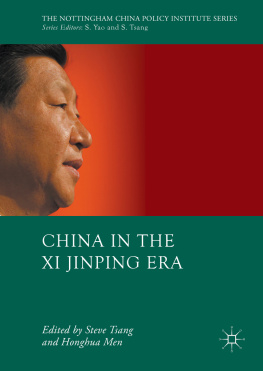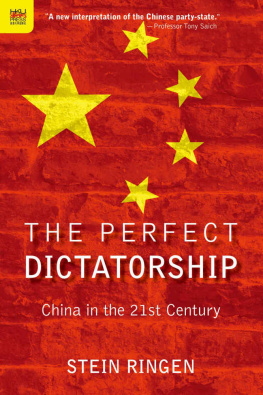CHINESE POLITICS IN THE XI JINPING ERA
Reassessing Collective Leadership
CHENG LI
BROOKINGS INSTITUTION PRESS
Washington, D.C.
Copyright 2016
THE BROOKINGS INSTITUTION
1775 Massachusetts Avenue, N.W., Washington, D.C. 20036
www.brookings.edu
All rights reserved. No part of this publication may be reproduced or transmitted in any form or by any means without permission in writing from the Brookings Institution Press.
The Brookings Institution is a private nonprofit organization devoted to research, education, and publication on important issues of domestic and foreign policy. Its principal purpose is to bring the highest quality independent research and analysis to bear on current and emerging policy problems. Interpretations or conclusions in Brookings publications should be understood to be solely those of the authors.
Library of Congress Cataloging-in-Publication data
Names: Li, Cheng, 1956 author.
Title: Chinese politics in the Xi Jinping era : reassessing collective leadership / Cheng Li.
Description: Washington, D.C. : Brookings Institution Press, 2016. | Includes index.
Identifiers: LCCN 2016017497 | ISBN 9780815726920 (paperback : alk. paper) | ISBN 9780815726937 (epub) | ISBN 9780815726944 (pdf)
Subjects: LCSH: ChinaPolitics and government2002 | Political LeadershipChina. | Xi, Jinping. | BISAC: POLITICAL SCIENCE / Political Ideologies / Communism & Socialism. | POLITICAL SCIENCE / International Relations / General.
Classification: LCC DS779.46 .L5227 2016 | DDC 951.06/12dc23
LC record available at https://lccn.loc.gov/2016017497
9 8 7 6 5 4 3 2 1
Typeset in Minion
Composition by Westchester Publishing Services
DEDICATED TO
LYNN T. WHITE III
A GREAT TEACHER, MENTOR, AND FRIEND
SINCE MY GRADUATE STUDENT YEARS
AT PRINCETON
CONTENTS
LIST OF FIGURES AND TABLES
FIGURES
TABLES
ACKNOWLEDGMENTS
Preparations for this book began in the autumn of 2013, approximately one year after the Chinese Communist Partys seminal 18th Congress. By then, it was already clear that major shifts were under way in Chinas political framework, though the extent and direction of those changes remained unclear. I owe my own understanding of and analysis on these changeswhere they derive from and what they might spell for the futureto a long list of individuals without whose creative thinking and insights this book project would never have been possible.
The intellectual inspiration and mentorship that guided this study, however, date back to the late 1980s and early 1990s, when I had the privilege of studying under leading scholars in the China-watching community. Although these academic gurus are no longer with us, their work continues to serve as an important foundation for todays scholarship. By standing on their shoulders, we can see just a little farther and a little more clearly than we would otherwise be able to. For their direct mentorship, I am grateful to Professor A. Doak Barnett; Arthur W. Hummel Jr., and James R. Lilley, both former ambassadors to China; Professor Lucian W. Pye; Professor Michel Oksenberg; and especially Professor Robert A. Scalapino, who advised my masters thesis at the University of California, Berkeley. I owe equally profound thanks to Professors Ho Ping-ti, Ray Huang, and Tang Tsou for their groundbreaking works on Chinese elite studies, though I regret that I never worked with them directly.
In parsing the dimensions of contemporary Chinese politics, I benefited from frequent thought-provoking discussions with foremost leaders and thinkers in the United States. For generously sharing their time, observations, and insights with me, I extend my heartfelt thanks to Henry Kissinger, Henry Paulson Jr., William Cohen, Stephen Hadley, Ambassador Carla Hills, Ambassador Robert B. Zoellick, Ambassador Jon Huntsman, Ambassador James Sasser, Ambassador Gary F. Locke, Barbara H. Franklin, Senator Mark Kirk, and Congressman Rick Larsen.
This books structure took shape under the feedback and guidance of Michael OHanlon, my colleague at the Brookings Institution, where he is the director of research for the Foreign Policy program and the co-director of the Center for 21st Century Security and Intelligence. Michael inspected the manuscript with his characteristic thoroughness, clarity, and precision. His detailed comments and suggestions guided major improvements at both the micro and macro levels. Bruce Jones, vice president and director of the Foreign Policy program, also provided many astute recommendations, which strengthened the core arguments of the book. I owe similarly profound thanks to two anonymous reviewers whose constructive criticisms resulted in a more detailed, nuanced, and balanced analysis, not to mention an argument better grounded in both empirical evidence and comparative perspectives.
I am humbled every day by the incredible knowledge and balanced analysis of my colleagues at Brookings. For sharing with me their wisdom, I am grateful to senior fellows Jeffrey Bader, Kenneth Lieberthal, Jonathan Pollack, David Dollar, Richard Bush, Qi Ye, and Katherine H.S. Moon, as well as nonresident fellows Thomas Christensen, Charles W. Freeman III, Evan Osnos, Pavneet Singh, Rachel Stern, and Daniel B. Wright. Outside of Brookings, I have been influenced and inspired over the years by the original work of seasoned China analysts who operate across a range of institutions, including Joseph Fewsmith, Paul Gewirtz, Avery Goldstein, David Mike Lampton, Susan V. Lawrence, Woo Lee, Deborah Lehr, Yawei Liu, Richard McGregor, Alice Miller, Andrew J. Nathan, Minxin Pei, Joshua Cooper Ramo, Anthony Saich, David Shambaugh, Victor C. Shih, Susan L. Shirk, Ezra F. Vogel, Dali Yang, Rachel Zhang and Zheng Yongnian.
No words can fully convey my gratitude to John L. Thornton, co-chair of the Brookings Board of Trustees, professor and director of the Global Leadership Program at Tsinghua University, and executive chairman of Barrick Gold Corporation. That John can dedicate himself fully to three demanding rolesand achieve uncompromised success in eachspeaks to his boundless energy and the value he brings to any endeavor he touches. His intellectual contributions to and financial support of the China Center at Brookingsnamed after himadhere to no earthly limits. Johns charitable spirit extends to his faith in the abilities of those around him, and I am humbled to have his continued trust and confidence. Furthermore, as one of only a few Americans to have enjoyed prolonged, intimate exposure to Chinas leaders throughout much of its rise on the world stage, Johns insights into Chinese leadership politics have been invaluable in shaping my own views and understanding.
I extend my utmost thanks to others whose generosity sustains important scholarly inquiries into China, U.S.-China relations, and Chinese politics: the Chubb Charitable Foundation, including my dear friend Evan Greenberg, chairman and chief executive officer of Chubb Limited; and Lee Folger, chairman of Folger Nolan Fleming Douglas Incorporated. Their support was instrumental in moving this project forward. I am also grateful for the support and encouragement of members of the Brookings China Council: Michael Ahearn, Anla Cheng, Deng Feng, Ding Jian, Jiang Weiming, Shen Nanpeng, Vaughan Smith, Michael Sweeney, Tang Xiaodan, Jerry Yang, Yang Yuanqing, and Zhang Chi. These individuals and institutions have given admirably and selflessly to sponsor impartial, objective research, no matter the findings.
Managing one of the countrys oldest think tanks amid a period of profound economic and political changeboth domestically and internationallyis no simple task, but the highly capable Brookings leadership has navigated these uncharted waters with ease and vision. For helping preserve a space for independent research in support of the public interest, and for providing a stable home in which the John L. Thornton China Center can continue to pursue its mission, I offer tremendous thanks to Strobe Talbott, president of Brookings; Martin Indyk, executive vice president of Brookings; and Ted Piccone, who was acting vice president and director of the Foreign Policy program at Brookings during the initial stages of this book and is now senior fellow in the Foreign Policy programs Latin America Initiative. I am enormously grateful to Bruce Jones, mentioned above, for his initiative and great inputalong with Martin Indykof the Order from Chaos project at Brookings, with its emphasis on leadership issues across numerous countries.
Next page


